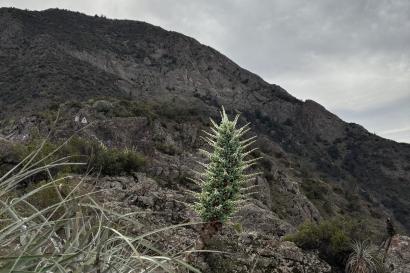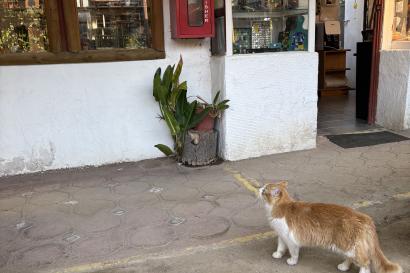I was never enchanted by Santiago.
From above, the dense, brown smog makes it hard to see the city at all, let alone the Andes. The architecture is bland, poorly maintained and out of place. Even Plaza de Arma’s historic cathedral stands in the depressing shadow of a brutally modern high rise.
And the people. Santiaguinos are notoriously cold. I imagine being smashed into public busses and metro trains like sardines could have that effect. And I’ll never forget the lady in the post office who scowled at me in utter disbelief for missing what she had said. I’m just a gringo who wanted stamps and she must have just endured jam-packed Transantiago. Customer service is not a cultural staple here—and indecency even extends to the highest realms of society. During a brief job stint at a cater service I waited on the President of the Republic. He refused to say thank you when I retired his dirty glass.
But I didn’t come to Santiago for Santiago. It was merely the city where I would be living and studying. I didn’t need to love it here. What it would provide, I thought, was access to experience and history that could arouse my Guevara-esque idealism and it would be a portal to Earth’s edge. Patagonia, after all, was always an essential, unspoken reason for deciding to come to Chile.
Even after six months I had not gained a sense of wonder about Santiago. It often seemed to reflect the worst of America—hyper consumerism and mayonnaise—and that was unsettling. There were parts of the city I had to avoid because seeing Latin America’s tallest shopping mall made me want to vomit. This, of course, was awfully inconvenient because that phallus symbol of capitalism can be seen from just about anywhere.
I haven’t been in Santiago for a while. I’m set to return soon and the truth is I’m not filled with the same lethargy I was when I left three months ago to gallivant around Patagonia and Buenos Aires.
Since I’ve been gone I’ve began to miss the busyness of it all, the sense that something is always going on somewhere—a farmer’s market, an art exhibit, a film festival—and my bike and I can get there with relative ease relatively soon. I never thought I’d miss weaving through traffic, a death wish in Santiago. Sundays were the best for riding. I could pedal my single speed down the city’s main arteries with no fear that at any moment I could smash into or be smashed by a ton of black and yellow steel because on these mornings the streets are closed off and ever more health-conscience Santiago gets outside.
Part of the joy of traveling I suppose is learning to cherish loneliness, to be singularly present with the beauty of the world. But as rewarding as life on the road has been, I am ready to return to the intensity of Santiago. My abovementioned contempt for the city is admittedly shallow and behind the haze and KFC frenzies and disgruntled commuters is important context that I’ve left out. That context helps explain Chile’s flexing of their recent albeit strong democratic muscles. From the heart of the city I watched Michelle Bachelet give her acceptance speech after she was elected president—I remember feeling motivated by her vision for a more equal Chile. That context also explains an inspiring generation of young people leading protests of tens of thousands demanding that Santiago and their nation do better. The leaders of these movements are my age, eloquent and thoughtful and ambitious and far more so than I could ever be.
That context explains why Chile recently commemorated 40 years since a military coup which led to the imprisonment or torture or exile of nearly 40,000 people and the killing and disappearing of more than 3,000. The legacy of Chile’s 16-year dictator is still fascinatingly polarized, but this year enjoyed vibrant dialogue informed by new information. Santiago is the hub for these history-defining conversations and I’ve been in the middle of it.
Obviously my characterization of Santiaguinos is shamefully general. To paint such broad strokes would be to ignore the professors who have taken extra time to explain complicated concepts to this struggling American; or the Chileans who have shared their personal histories with me of life during and after dictatorship; or the host family who welcomed me into their hearts and became real family. To do so is to ignore Lucas, my five-year-old host brother, a three-foot body of love and enthusiasm who, as I was leaving for my trip, ran toward me to hug my leg.
“Te quiero, hermano,” he said.
My flight to Santiago leaves tomorrow at 10. At noon, I’ll be home.
Mason Bryan
<p><span style="color: rgb(29, 29, 29); font-family: Arial, Verdana, sans-serif; font-size: 12px; line-height: normal; background-color: rgb(237, 237, 237);">I hale from New Mexico, but after moving to Seattle for college, I couldn't be more proud to feel part of the Pacific Northwest. But a romantic longing for adventure and a pragmatic understanding of today's unsympathetic economy has brought me to a new chapter: A year abroad in Santiago, Chile. This is my South American story.</span></p>



